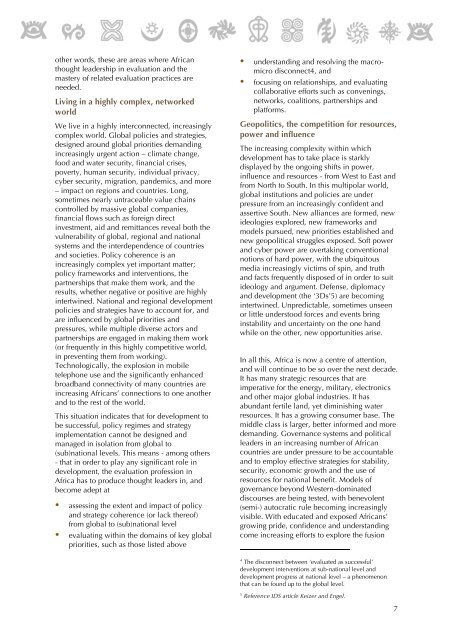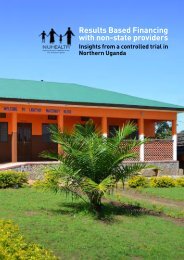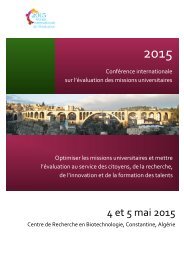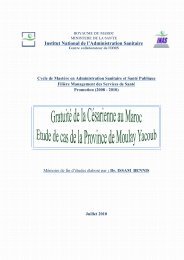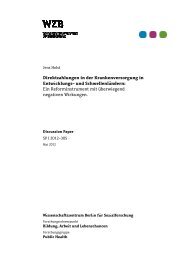Bellagio-Report-Vs-Apr-14
Bellagio-Report-Vs-Apr-14
Bellagio-Report-Vs-Apr-14
Create successful ePaper yourself
Turn your PDF publications into a flip-book with our unique Google optimized e-Paper software.
other words, these are areas where Africanthought leadership in evaluation and themastery of related evaluation practices areneeded.Living in a highly complex, networkedworldWe live in a highly interconnected, increasinglycomplex world. Global policies and strategies,designed around global priorities demandingincreasingly urgent action – climate change,food and water security, financial crises,poverty, human security, individual privacy,cyber security, migration, pandemics, and more– impact on regions and countries. Long,sometimes nearly untraceable value chainscontrolled by massive global companies,financial flows such as foreign directinvestment, aid and remittances reveal both thevulnerability of global, regional and nationalsystems and the interdependence of countriesand societies. Policy coherence is anincreasingly complex yet important matter;policy frameworks and interventions, thepartnerships that make them work, and theresults, whether negative or positive are highlyintertwined. National and regional developmentpolicies and strategies have to account for, andare influenced by global priorities andpressures, while multiple diverse actors andpartnerships are engaged in making them work(or frequently in this highly competitive world,in preventing them from working).Technologically, the explosion in mobiletelephone use and the significantly enhancedbroadband connectivity of many countries areincreasing Africans’ connections to one anotherand to the rest of the world.This situation indicates that for development tobe successful, policy regimes and strategyimplementation cannot be designed andmanaged in isolation from global to(sub)national levels. This means - among others- that in order to play any significant role indevelopment, the evaluation profession inAfrica has to produce thought leaders in, andbecome adept at!• assessing the extent and impact of policyand strategy coherence (or lack thereof)from global to (sub)national level• evaluating within the domains of key globalpriorities, such as those listed above• understanding and resolving the macromicrodisconnect4, and• focusing on relationships, and evaluatingcollaborative efforts such as convenings,networks, coalitions, partnerships andplatforms.Geopolitics, the competition for resources,power and influenceThe increasing complexity within whichdevelopment has to take place is starklydisplayed by the ongoing shifts in power,influence and resources - from West to East andfrom North to South. In this multipolar world,global institutions and policies are underpressure from an increasingly confident andassertive South. New alliances are formed, newideologies explored, new frameworks andmodels pursued, new priorities established andnew geopolitical struggles exposed. Soft powerand cyber power are overtaking conventionalnotions of hard power, with the!ubiquitousmedia increasingly victims of spin, and truthand facts frequently disposed of in order to suitideology and argument. Defense, diplomacyand development (the ‘3Ds’5) are becomingintertwined. Unpredictable, sometimes unseenor little understood forces and events bringinstability and uncertainty on the one handwhile on the other, new opportunities arise.!!!In all this, Africa is now a centre of attention,and will continue to be so over the next decade.It has many strategic resources that areimperative for the energy, military, electronicsand other major global industries. It hasabundant fertile land, yet diminishing waterresources. It has a growing consumer base. Themiddle class is larger, better informed and moredemanding. Governance systems and politicalleaders in an increasing number!of Africancountries are under pressure to be accountableand to employ effective strategies for stability,security, economic growth and the use ofresources for national benefit. Models ofgovernance beyond Western-dominateddiscourses are being tested, with benevolent(semi-) autocratic rule becoming increasinglyvisible. With educated and exposed Africans’growing pride, confidence and understandingcome increasing efforts to explore the fusion4The disconnect between ‘evaluated as successful’development interventions at sub-national level anddevelopment progress at national level – a phenomenonthat can be found up to the global level.5Reference IDS article Keizer and Engel.7


